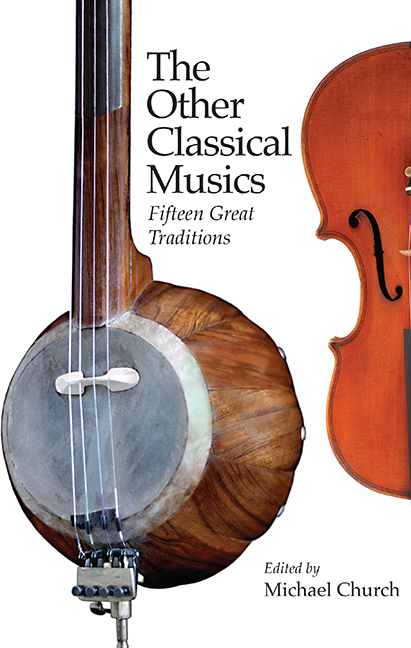Book contents
- Frontmatter
- Dedication
- Contents
- List of Illustrations
- List of Contributors
- Preface and Acknowledgements
- Introduction
- Maps
- 1 Thailand, Laos, Cambodia, Vietnam
- 2 Java
- 3 Japan
- 4 China: The Guqin Zither
- 5 Chinese Opera
- 6 North India
- 7 South India
- 8 Mande Jaliyaa
- 9 North American Jazz
- 10 Europe
- 11 North Africa and the Eastern Mediterranean: Andalusian Music
- 12 The Eastern Arab World
- 13 Turkey
- 14 Iran
- 15 Uzbekistan and Tajikistan
- Notes
- Bibliographies
- Index
1 - Thailand, Laos, Cambodia, Vietnam
Published online by Cambridge University Press: 29 May 2021
- Frontmatter
- Dedication
- Contents
- List of Illustrations
- List of Contributors
- Preface and Acknowledgements
- Introduction
- Maps
- 1 Thailand, Laos, Cambodia, Vietnam
- 2 Java
- 3 Japan
- 4 China: The Guqin Zither
- 5 Chinese Opera
- 6 North India
- 7 South India
- 8 Mande Jaliyaa
- 9 North American Jazz
- 10 Europe
- 11 North Africa and the Eastern Mediterranean: Andalusian Music
- 12 The Eastern Arab World
- 13 Turkey
- 14 Iran
- 15 Uzbekistan and Tajikistan
- Notes
- Bibliographies
- Index
Summary
The door is surrounded by a sea of shoes: even the audience must remove them and sit cross-legged on the floor. And this is no ordinary concert. At the front is a spectacular altar consisting of musical instruments arranged in multiple layers; even more striking is the central platform filled with masks, flowers, bowls of food and sundry mysterious objects. A group of young students come in and sit together, some giggling, others looking confused; the elderly ritualist enters and begins a monotone chant. When he has finished he announces the title of a composition to be played by the musicians arranged behind xylophones, gong-circles, drums, percussion and a thick wooden wind instrument: ‘Sathukan!’ (‘greeting the teacher’). Initially the music is a sweep of seemingly unrelated pitches, an outpouring of activity by each individual musician that is hard to grasp: despite the percussion, it’s difficult to perceive anything resembling a measure or a phrase. Finally, after many more such pieces, each student comes forward to receive a ritual ‘first lesson’ either on the large gong-circle or the flute, in which the teacher holds the student's hands to simulate the playing of the piece. Each then receives a soot-mark on the forehead, and over one ear a piece of banana leaf with a flower. Having greeted the teacher (khru, guru in Thai) whose lineage extends to the gods themselves – since all knowledge derives from them – each student is now eligible to be instructed in music.
▪ History
To address the question of whether any music in mainland Southeast Asia can be called ‘classical’, we must first consider the term. ‘Classical’ is an English word that not only denotes a vast corpus of European and American music but carries connotations of hierarchy, value and sophistication. Applied to music in Thailand, Laos, Cambodia or Vietnam, it risks creating inappropriate associations, especially in the case of Vietnam, yet commentators from both Southeast Asia and elsewhere have long used ‘classical’ to describe this music. Just as the European elite were the patrons of Western classical music, in Southeast Asia the aristocracy, and especially the extended royal family, performed this function too. Add to that local perceptions of this music in those same terms of hierarchy, value and sophistication, and you may conclude that ‘Thai classical’ and ‘Lao classical’ are indeed appropriate.
- Type
- Chapter
- Information
- The Other Classical MusicsFifteen Great Traditions, pp. 25 - 49Publisher: Boydell & BrewerPrint publication year: 2015



